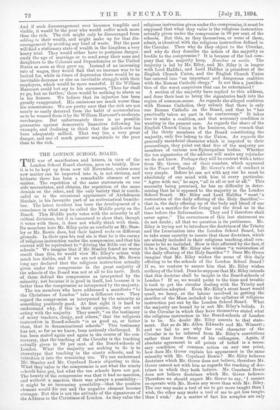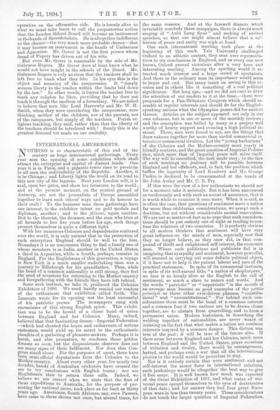THE LONDON SCHOOL BOARD.
fir HE war of manifestoes and letters, in view of the 1 London School Board election, goes on briskly. How it is to be kept up from now till November, unless some new matter can be imported into it, is not obvious, and hitherto there has been a remarkable absence of now matter. The repetition of the same statements on one side necessitates, and obtains, the repetition of the same denials on the other, and the only variety that is vouch- safed us is the occasional appearance of Archdeacon Sinclair, in his favourite part of an ecclesiastical bumble- bee. The latest incident has been the development of a conscience in what may be called the Middle party on the Board. This Middle party votes with the minority in all -critical divisions, but it is concerned to show that, though it votes with them, it does not wholly think with them. Its members hate Mr. Riley quite as cordially as Mr. Stan- ley or Mr. Bowie does, but their hatred rests on different grounds. In their eyes his real sin is that he is the enemy of religious instruction under the compromise, and that his success will be equivalent to " driving the Bible out of the schools." We imagine that if Mr. Stanley feared no worse result than this, he would view Mr. Riley's action with much less dislike, and if we are not mistaken, Mr. Bowie long ago declared that the religious instruction actually given under the compromise in the great majority of the schools of the Board was not at all to his taste. Both of them defend the compromise as interpreted by the .aninority, not because it is good in itself, but because it is better than the compromise as interpreted by the majority. The ten members who have addressed a manifesto " to the Christians of London" take a, different view. They 'regard the compromise as interpreted by the minority as something positively good. At first sight it is hard to understand why, if this is their opinion, they are not -acting with the majority. They assert, " on the testimony -of many teachers, clergy, and others," that the religious instruction in Board-schools "is as good as, or better than, that in denominational schools." This testimony has not, so far as we know, been seriously challenged. It has been stated again and again in the course of the con- troversy, that the teaching of the Circular is the teaching sictually given in 90 per cent. of the Board-schools of London. What the majority are seeking to do is to stereotype that teaching in the ninety schools, and to introduce it into the remaining ten. We can understand Mr. Stanley and Mr. Copeland Bowie objecting to this. What they value in the compromise is not what the ninety schools have got, but what the ten schools have not got. The beauty of the compromise was that it had no sanction, and without a sanction there was always a possibility-- it might be an increasing possibility—that the positive element would die out and the negative element become stronger. But this is not the attitude of the signatories of the Address to the Christians of London. As they value the religious instruction given under the compromise, it must be supposed that what they value is the religious instruction actually given under the compromise in 90 per cent. of the schools. But this, as they themselves, or some of them, admit, is identical with the religious instruction defined in the Circular. Then why do they object to the Circular, and why do they describe the action of the majority as hostile to the compromise ? It is because of the bad com- pany that the majority keep. Noscitur ex sociis. The majority is led by Mr. Riley, and Mr. Riley is in league with Lord Halifax, and Lord Halifax is president of the English Church Union, and the English Church Union has entered into "an important and dangerous coalition with the Roman Catholic clergy." Is not this a justifica- tion of the worst suspicions that can be entertained ? A section of the majority have replied to this address, and done their best to bring the signatories back into the region of common-sense. As regards the alleged coalition with Roman Catholics, they submit that there is only one Roman Catholic on the Board, and that he " has practically taken no part in the controversy." It takes two to make a coalition, and that necessary condition is wanting in the present case. As regards the share of the English Church Union in the business, they remark that of the thirty members of the Board constituting the majority, only five belong to the Union. As regards the generally sacerdotal character which is imputed to their proceedings, they point out that five of the majority are members of various non-Episcopalian bodies. Whether the ten signatories of the address will make any rejoinder we do not know. Perhaps they will be content with a letter from Mr. Gover, one of their number, which appeared. in the Times of Tuesday. Mr. (lover's rule of conduct is very simple. Before he can act with any one he must be absolutely of one mind with him every particular. " Agree with me," he says, " all in all or not at all." This necessity being premised, he has no difficulty in deter- mining that he is opposed to the majority in the London School Board. Mr. Riley and Lord Halifax " want restoration of the daily offering of the Holy Sacrifice,'— that is, the daily offering up of the body and blood of our Lord as a sacrifice for the living and the dead as in the time before the Reformation. They and I therefore shall never agree." The correctness of this last statement we do not doubt ; all that we question is its pertinence. Mr. Riley is trying not to introduce the doctrines of the Trinity and the Incarnation into the London School Board, but to take some security to insure that these doctrines, which are already included in their religious teaching, shall con- tinue to be so included. How is this affected by the fact, if it be a fact, that Mr. Riley also wishes "a restoration of the daily offering of the Holy Sacrifice " ? Does Mr. Gover imagine that Mr. Riley wishes the scene of this daily offering to be the schools of the London School Board ? If so, we venture to assure him that Mr. Riley wishes nothing of the kind. Does he suppose that Mr. Riley intends that this doctrine shall be taught in the Board-schools of London ? If so, we would point to the time and trouble it took to get the circular dealing with the Trinity and Incarnation adopted. Even Mr.tRiley's stout heart would quail, we fancy, at the labour involved in getting the sacrifice of the Mass included in the syllabus of religious instruction put out by the London School Board.. What the majority are bound by is not Mr. Riley's beliefs. It is the Circular in which they have themselves stated what the religious instruction in the Board-schools of London is to be. No doubt Mr. Riley assents to that state- ment. But so do Mr. Allen Edwards and Mr. Winnett ; and we fail to see why the real character of the Circular is to be inferred from Mr. Riley's convictions rather than from those of his colleagues. Again, if absolute agreement in all points of belief is a neces- sary condition of common action on any one point, how does Mr. Gover explain his appearance in the same minority with Mr. Copeland Bowie ? Mr. Riley believes doctrines which Mr. Gover does not believe, therefore Mr. Gover cannot act with him as regards the teaching of doc- trines in which they both believe. Mr. Copeland Bowie does not believe doctrines which Mr. Gover believes. Therefore we should expect Mr. Gover to say, I cannot co-operate with Mr. Bowie any more than with Mr. Riley. The one may make a tool of me to get more taught than I wish, the other may make a tool of me to get less taught than I wish.' As a matter of fact his scruples are only operative on the affirmative side. He is keenly alive to what we must take leave to call the preposterous notion that the London School Board will become an instrument in the hands of Sa,cerdotalists. He is altogether indifferent to the chance—the very much more probable chance—that it may become an instrument in the hands of Unitarians and Agnostics. Mr. Gover is not the first person whom, dread of Popery has driven out of his wits.
But even Mr. Gover is reasonable by the side of Mr. Guinness Rogers. Mr. Gover does at least know what he -would not have taught in the schools of the Board. Mr. Guinness Rogers is only anxious that the teachers shall be left free to teach what they like. In his eyes this is the object and meaning of the compromise. It " simply secures liberty to the teacher within the limits laid down by the law." In other words, it leaves the teacher free to teach any religion he likes, providing that he does not teach it through the medium of a formulary. We are asked to believe that men like Lord Harrowby and Mr. W. H. Smith, when they were considering the compromise, were thinking neither of the children, nor of the parents, nor of the ratepayers, but simply of the teachers. Perish re- ligious teaching, they said, rather than that the liberty of the teachers should be interfered with ! Surely this is the greatest demand yet made on our credulity.


































 Previous page
Previous page